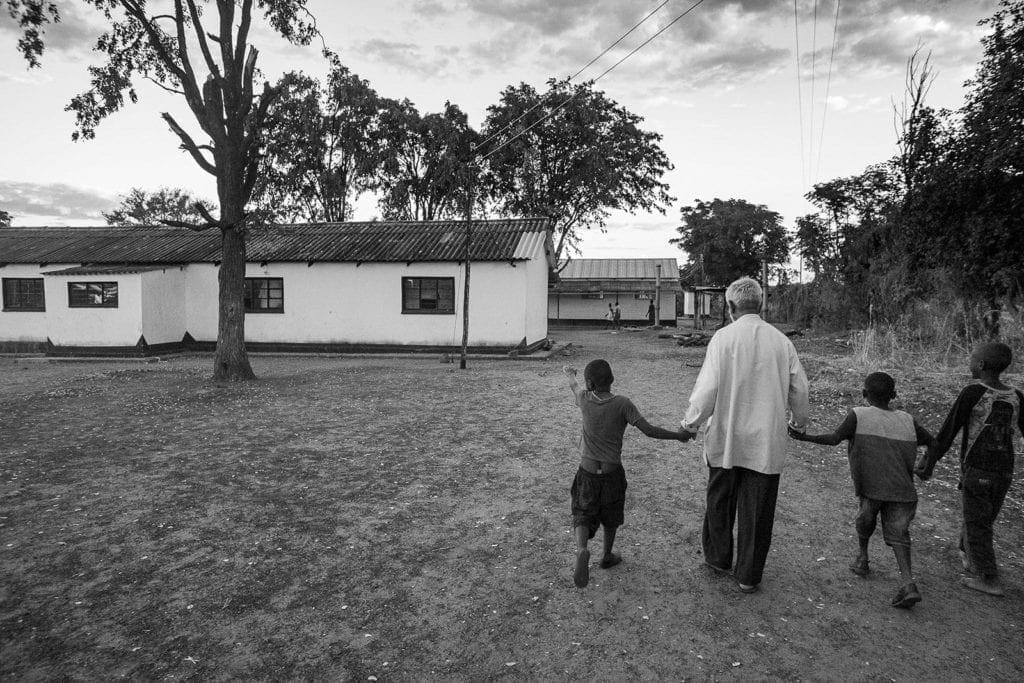This is neither a cliché nor a mere figure of speech. Too often, one forgets one’s good fortune. One forgets that being born without handicaps in the ‘right’ part of the world was pure chance. One fails until one comes across those who did not have the same fate. On the contrary. Some were not only born blind, deaf, dumb, or with mental deficits but also born in the wrong place.
He was born in the South. He was born in Africa.
When Michelle cannot express what she wants, she gets angry, pulls at her shirt, and gesticulates. The big dark eyes change and become even more expressive, if possible. They become her voice, which she has never had because she was born mute. Becoming Gabriele‘s shadow in a few moments, she wishes she could ask a thousand things and tell as many. But she fails.
Michelle is just one of the hundreds of children welcomed in Fatima Mission, in Lupane, Zimbabwe. Children who are mute, blind, physically or mentally disabled, or young women in distress are left to their own devices. Father J, with his helpers, gives them a hand, a chance, a hope.
Father Jerald and Sister Clara
He was not very tall, with an olive complexion, clear eyes, and a Zen-like calmness that he managed to convey in his voice and manner, fresh from no fewer than eight bouts of malaria, one of which almost led to his death. Father Jerald, this is his full name, is of Indian origin. A former Hindu priest, he converted to Catholicism to become a missionary. During his Hindu priesthood, he saw many suffering people in his country and noticed that his religion did little to help them. Catholicism, on the other hand, was directly involved in the field. Hence the decision to convert. He wanted to be helpful to his brothers and sisters. «Two souls coexist in me and will always do», he explained, «thanks to their interaction, I have been able to understand both religions better».
At his side is an elderly nun of Anglo-Saxon origin, Sister Clara, who has been in Lupane for 50 years. Sister Clara is indomitable and tireless. Despite her age, she still teaches. Her thoughts on being a missionary right in Lupane can be summed up in a sentence she confided to us: «If I were born again, I would do it all over again. I would not change anything about my life as I would never go back home. Fatima is the best place to die».
The welcome offered by the two religious people at Fatima Mission is not welfarism. It is not just maintenance. It is, above all, to provide an alternative, possibilities and prospects through education. All the children, or almost all, of Fatima Mission study. Even blind people. For those who cannot spend time on books, there is plenty of love, a feeling the children can pass on to each other and distribute to those who come along. The older ones help the younger ones, and those with no physical impediments help those who do. No one is a stranger. They are all brothers—one big family.

In Fatima Mission happiness is in the little things
The mission is organised in different structures scattered around the territory. On one side is the ‘parish house’, if you want to call it that, home to the religious. Just outside the boundary gate is a mill not far from the church, also used by the area’s inhabitants. Behind the school and next are the dormitories for boys and girls. No asphalt or cement on the roads only rammed earth. Inside, the dormitories are organised in large dormitories with bunk beds. Little light and no toilets. These are located outside.
Like a lousy thread that unites many African missions, the mission lacks necessities. From the electricity, provided by a generator switched off at 10 pm, to the water, laboriously extracted from a well, a few books and few funds. The Fatima Mission supports itself for food by cultivating the fields and raising pigs and other animals. All this does not overly disturb the collective serenity. A solution has always been found and still will be found. It is not resignation. It is called faith. It is not only the youngest who have found a reference in the commitment of Father J. Many are the adults involved in the fields and farms. Just as many turn to the priest for advice or comfort.
It is true when they say that happiness is in the little things. For the guests and students of Lupane, it is enough to be together, to run barefoot after a ball that runs freely around the school yard. There are no teams and no winners. There are only little footballers, both boys and girls, having fun, chasing each other, who seems to need nothing else to have a little corner of serenity.
Despite the distance and the time that has passed, Michelle’s voice does not die out. She keeps asking to understand and learn, and with her, the voices and looks of all her fellow travellers.

